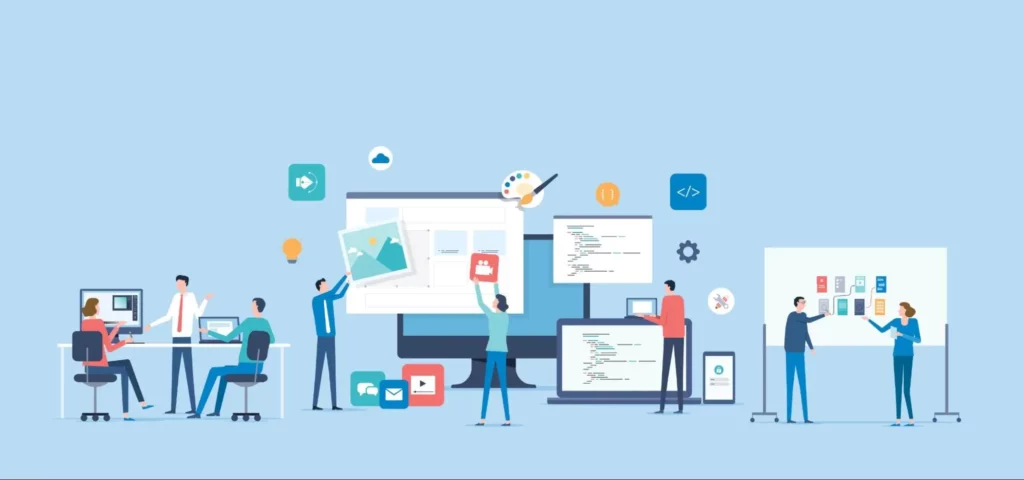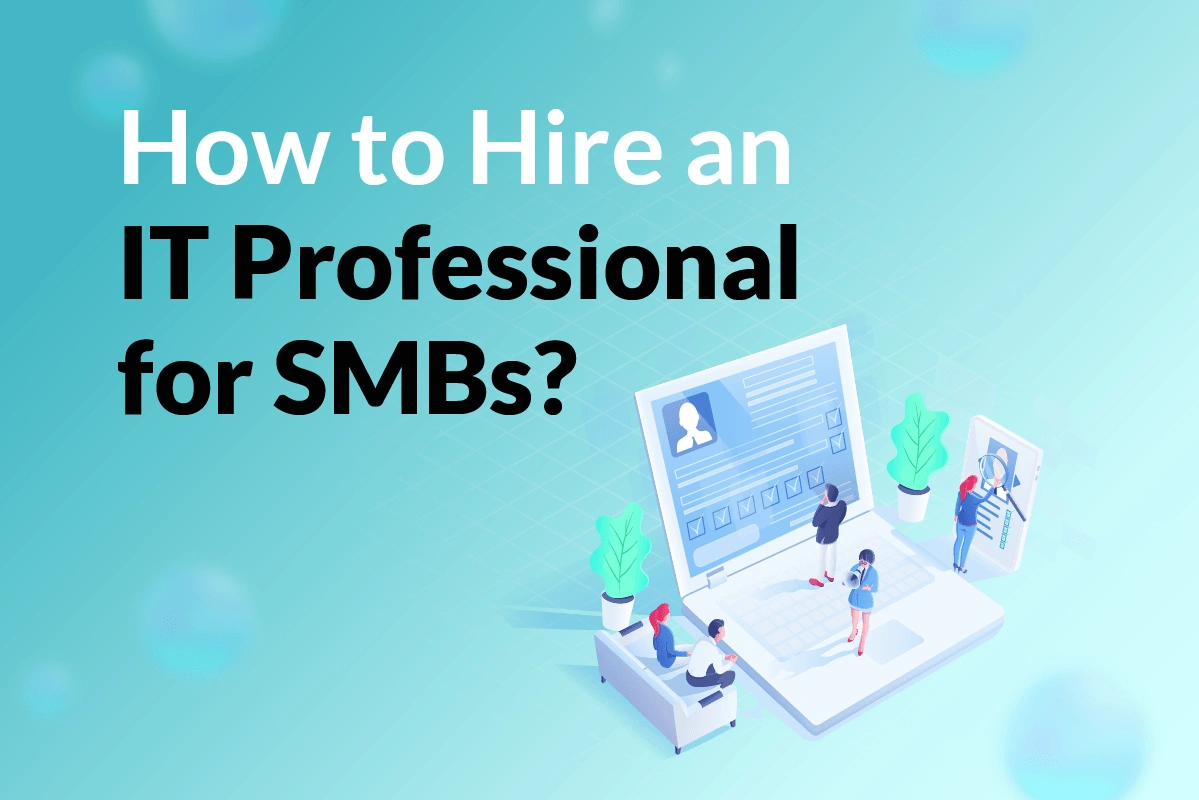For small and medium businesses, the key to thriving in a tech-centric market is knowing how to hire an IT professional who can quickly manage computer systems and resolve technical issues efficiently to maintain productivity.
However, finding such talent is increasingly challenging, as highlighted by the annual KPMG CIO survey, where over 65% of CIOs report difficulties sourcing tech talent.
We’ll walk you through identifying the IT skills your business needs, setting competitive salaries, conducting thorough candidate assessments, and making an effective job offer.
- Identifying Essential IT Professional Duties
- Detailing an IT Professional’s Job Requirements
- Understanding Different IT Professional Roles
- Outlining Benefits for IT Professional Positions
- Setting the Right Salary for an IT Professional
- Publish Your Job Opening Where Your Ideal Candidate Will See It
- Conducting Productive IT Interviews
- Finalizing Your IT Professional’s Job Offer
- FAQs About Hiring an IT Professional
- Trust the Professionals
By following these steps, you can confidently hire an IT professional who contributes to your business’ long-term technological health and efficiency.
Identifying Essential IT Professional Duties
Technical issues in small and medium businesses create different skill requirements for an IT professional. Therefore, the range of responsibilities for this role is not one size fits all. A well-trained IT employee should be able to cover most of the following basic duties:
- Maintaining Networks: Keeping the internal network active to ensure stable workflow.
- IT Operations: Managing day-to-day activities like security testing, device management, and tech support. These tasks maintain the smooth operation and security of a company’s technology infrastructure.
- IT Governance: Ensuring that technological systems comply with industry regulations.
- Hardware and Software Lifecycle Management: IT specialists manage the entire lifecycle of hardware and software, from development and testing to installation, repair, and maintenance.
- Network Systems Administration and Support: This includes regularly updating and troubleshooting the computer network systems to maintain reliable and efficient connectivity throughout the organization.
- Programming and Software Development: They are responsible for integrating applications and software, combining technical skills with creative problem-solving.
Detailing an IT Professional’s Job Requirements
Both educational background and practical experience come into play when outlining the job requirements for an IT professional. But, as Doug Garrard, Sr. Field Services Manager at Schneider Electric, once noted:
“When it comes to education vs. experience in an IT professional, I tend to weight things pretty heavily towards experience.”
Doug Garrard
| Requirement Type | Details |
| Education | Degree from 2 year or 4-year school in Computer Science, Computer Engineering, or Information Technology. With extensive experience, certifications could hold the same value. |
| Certifications | – Certified Data Professional (CDP): Demonstrates proficiency in Data Management and Information Systems. Requires passing two exams and specialization exams for higher-level management. – Certified Information Systems Security Professional (CISSP): For experts with at least 5 years of experience in security and risk management. – Certified Information Systems Auditor (CISA): Standard requirement for roles in auditing and security. |
| Skills | – Communication: The IT specialist must know how to communicate with the internal technical team when dealing with IT systems’ issues. – Problem-solving: Most IT issues require the IT specialist to have solid knowledge and several years of experience. – Coding: A must-know skill to help analyze systems, develop and integrate applications. – Analytical: The IT specialist should be able to quickly assess issues in order to shorten the time and money spent addressing problems. – Cybersecurity Basics: Entry-level IT pros need a solid foundation in cybersecurity, it can be built through real-world experience and targeted courses. – Cloud Server Management: Many IT companies require cloud server understanding in their candidates since companies increasingly use cloud based servers for ease of access and better security. |
While acknowledging the value of educational qualifications, the hiring experts from Boulo also emphasize real-world experience more.
Understanding Different IT Professional Roles
Before you start writing a job description or posting a job ad, knowing what specific IT professional suits your company’s current background lies foremost in seeking one.
As information technology expands to a wide range of positions, let’s delve into the most common IT job titles with their brief descriptions.

- Software Developer: Pioneers in coding, Software Developers create and fine-tune software for both businesses and consumers. Utilizing languages like Java and C++, they collaborate with clients to understand needs and deliver effective programs. Their role involves critical thinking and adept problem-solving to create solutions that meet user needs efficiently.
- Cyber Security Specialist: Cyber Security Specialists are tasked with fortifying information systems. They stand as the first line of defense against external threats like hackers, ensuring the safety of networks and sensitive data. The role involves implementing security measures, conducting vulnerability assessments, and staying abreast of the evolving cyber threat landscape.
- IT Help Desk Technician: The troubleshooters and client satisfaction experts, IT Help Desk Technicians provide essential technical support and assistance. They are often the first point of contact for customers facing technological challenges, requiring them to have excellent communication skills and a deep understanding of tech issues to provide effective solutions.
- Computer Network Engineer: Network Engineers are the architects of an organization’s digital communication channels. They set up and maintain networks within and between organizations, support users, and resolve issues, requiring strong troubleshooting skills and the ability to work collaboratively.
- IT Project Manager: IT Project Managers ensure that projects are completed on time and within budget. They coordinate resources, manage project timelines, and maintain project scopes. Their role requires a blend of technical and managerial skills to oversee complex IT projects successfully.
- Database Administrator (DBA): Protectors of data, Database Administrators ensure the smooth operation of databases. They are responsible for database systems’ high availability and quality, designing and implementing databases according to end-user needs, and safeguarding data security and integrity.
Outlining Benefits for IT Professional Positions
According to Indoor, over 70% of employers struggle to find the right talent.
Most IT candidates look for specific factors such as a positive work culture, competitive salary, fulfilling roles, and suitable job locations. If you emphasize these points in your job posting, it can help attract skilled IT professionals.
At a minimum, you need to consider offering these benefits to your candidates:

- Flexible Work Options: Emphasize remote and hybrid work arrangements, allowing IT specialists to balance their work with mental health and personal life. Such flexibility prevents burnout and promotes a healthy work-life balance. IT professionals often need hours of uninterrupted focus time that is often unavailable in today’s open workspaces.
- Insurance Packages: Offer a range of insurance benefits, including dental, vision, and life insurance. This comprehensive approach shows the company’s commitment to the overall well-being of its employees.
- Generous Paid Time Off: Be clear about the paid time off policy, detailing the number of vacation days, sick days, and personal days employees are entitled to.
- Investment in Professional Development: Highlight opportunities for paid training and skill development. Show that the company supports and invests in its IT staff’s continuous growth and advancement.
- Performance Incentives and Bonuses: Showcase performance-related bonuses and rewards. This motivates high performance and demonstrates the company’s appreciation for hard work and significant contributions.
Setting the Right Salary for an IT Professional
Depending on the level of expertise and the complexity of the projects the candidates will handle, employers can adjust the salary to align with the benchmarks for various IT roles.
To assist in determining a fair compensation that reflects the nature of the work and the value of the candidate, here are some reference salaries for popular IT jobs according to Salary:
Cybersecurity Job:
- Information Security Analyst: Average salary $88,735/year.
- Ethical Hacker/Penetration Tester: Average salary $105,331/year.
- Security Architect: Average salary $130,125/year.
Software Development Job:
- Full-stack Developer: Average salary $101,581/year.
- Mobile App Developer: Average salary $101,854/year.
- DevOps Engineer: Average salary $128,464/year.
- Front-end Web Developer: Average salary $87,785/year.
IT Infrastructure Job:
- Network Administrator: Average salary $84,913/year.
- Systems Administrator: Average salary $69,906/year.
- Cloud Architect: Average salary $140,940/year.
- Data Center Manager: Average salary $147,192/year.
IT Support Job:
- Help Desk Technician: Average salary $48,006/year.
- Desktop Support Specialist: Average salary $46,820/year.
- IT Support Specialist: Average salary $56,775/year.
Data Management Job:
- Data Analyst: Average salary $82,818/year.
- Database Administrator: Average salary $98,377/year.
- Data Architect: Average salary $127,697/year.
- Data Governance Manager: Average salary $114,552/year.
These figures provide a guideline to help employers offer competitive and fair salaries that attract the right talent in the IT field. You will need to take into consideration the salaries in city, as well.
Publish Your Job Opening Where Your Ideal Candidate Will See It
IT positions are in high demand; therefore, finding the right talent quickly isn’t easy. You can no longer post a job and wait for applicants; you have to stand out in a crowded field and search in the right places to find untapped talent.
However, this can be more challenging than it appears, especially when competing against well-established brands that often attract a larger pool of applicants via common platforms like LinkedIn and Indeed.
Effective hiring strategies now require new tools; one way of doing that is with Boulo to access a hidden talent pool of experienced candidates.

Our expertise lies in fine-tuning your recruitment process and providing a skills based approach to resume reviews. And, because of our experience working with small to medium-sized businesses, we know how to take your job posting from just another ad to a must-see opportunity.
Here’s how Boulo does that:
- Fast and Efficient Posting: Boulo helps you to hire a qualified candidate you’re excited about up to 7 days faster.
- Access to a Broad Network: You can gain access to our expansive community of over 64,000 candidates with an average of 10 years of experience across various sectors.
- Proven Track Record: With more than 500 successful placements across various industries, our expertise in matching the right talent with the right job is well-established.
We match your job opening with candidates who have the essential skills that fit your business’ vision and goals, paving the way for long-term success.
Conducting Productive IT Interviews
Once your job postings are active, you’ll start receiving candidate resumes. Begin by sorting through them, focusing on candidates who align with the role’s requirements, and schedule interviews.
In the interview stage, dig into each candidate’s background with specific questions.
- Challenging Technical Problem: “Tell me about a tough technical problem you’ve solved. How did you approach it?”
This question shows their problem-solving skills and creativity, showing how they handle complex IT challenges. You can ask questions about specific technology used to gauge whether they know your specific technology base.
- Staying Updated: “How do you keep up with the latest in technology and industry trends?”
Gauge their dedication to ongoing learning and development in a fast-paced field.
- Teamwork Example: “Can you give an example of how you’ve effectively worked within a team?”
Since creating a positive group dynamic in the workplace lies in effective communication, empathy, and a shared sense of purpose, this question shows how the candidates handle team situations and work with others.
- Explaining Technical Concepts: “Describe how you’ve explained a complex technical concept to someone non-technical.”
This evaluates their communication skills, particularly their ability to make complex IT terms understandable to everyone.
- Specific Software/Hardware Experience: “What’s your experience with [specific software/hardware]?”
Directly assesses their hands-on experience with the tools and technologies they’ll use in the role.
While these questions form the foundation of the interview, they open the door for more in-depth conversations.
Finalizing Your IT Professional’s Job Offer
The final offer should align with the discussions between the two sides regarding requirements, responsibilities, and negotiated salary.
- Decide on the Salary: Consider the candidate’s experience and skills and the market rate for the role when deciding on a competitive salary. Match that with the candidate’s requirements.
- Prepare the Job Offer: This should include the job title, who the hire will report to, their working schedule, compensation, bonus or commission, employee benefits and bonus reward, privacy policies, termination conditions (if relevant), and the date the job offer expires.

- Communicate the Job Offer: You should call and email candidates to announce you’re extending a job offer before sending the formal letter.
- Negotiate the Offer: If the candidate has any concerns or requests, be open to negotiation. This could involve salary, benefits, working hours, and other adjustments.
- Set a Decision Timeline: Give the candidate a fair amount of time to consider the offer thoughtfully.
- Keep the Lines of Communication Open: Stay in touch after extending the offer, making yourself available to answer questions and confirm their final decision.
Handle the process with clear communication, genuine interactions, and a focus on forming a lasting professional bond.
FAQs About Hiring an IT Professional
When you decide to hire an IT professional, some particular questions about this hiring process may arise. Let’s address some of the pressing ones.
1. How do we ensure that our IT hires are adaptable and capable of wearing multiple hats on a small team?
To build an effective yet small IT team, prioritize candidates with diverse IT skills and a history of adaptability.
When interviewing, focus on uncovering their experiences in diverse IT scenarios and their eagerness to learn and grow in multifaceted roles. Also, your questions should aim to reveal their capacity for quick learning, innovative problem-solving, and effective collaboration in team settings.
If the thought of managing this process on your own feels overwhelming and takes you away from core business activities, Boulo’s Scale package is your go-to option. The package simplifies the hiring process for SMEs by offering custom pricing and handling the recruitment process from start to finish. All of which frees up your time to concentrate on essential business matters.
2. How do we assess an IT candidate’s ability to align technology solutions with our SMB’s business goals?
When interviewing, focus on their track record of implementing technology solutions. Ask for specific examples of how they’ve used technology to solve business problems or enhance operations within budget or operating constraints. Furthermore, assess their ability to explain technical ideas to non-technical audiences and their proactive use of technology in achieving business goals.
The real test is in locating candidates adept at closing the gap between technology and business, but this is where Boulo can help. Our plans provide a solid foundation for successful hiring by showcasing company culture, building a talent pool, vetting candidates for hard and soft skills, ensuring quick and effective recruitment of tech-savvy business professionals.
3. How can we ensure that the IT professional we hire understands the unique challenges and opportunities of working in an SMB?
Begin with clearly defining your objectives, budget or man power limitations and specific expectations for candidates, ensuring they align with the candidate’s understanding of the role.
Implementing technical tests, cultural interviews, and thorough reference checks, allows you to evaluate their skills in the context of your environment.
4. How can remote IT professionals be integrated into our SMB’s work environment and culture effectively?
To effectively bring remote IT professionals into your SMB’s culture, focus on providing robust communication tools for seamless collaboration. Establish live communication on a weekly or twice weekly basis across teams.
Start each call with a short personal discussion so the team can get to know each other beyond work. You’ll soon foster a culture of trust and empowerment, encouraging ideas and ownership.
Trust the Professionals
The process of hiring an IT professional becomes the foundation of your technological operations. Despite the intense competition for top IT talent, securing industry-leading tech professionals is still achievable for your organization.
When you post a job with Boulo, our deep understanding of your specific needs and our cost-effective and efficient solution for filling IT roles simplify the complex. Let Boulo execute finding your company’s security, data management, and networking IT personnel so you can concentrate on your core business activities.

